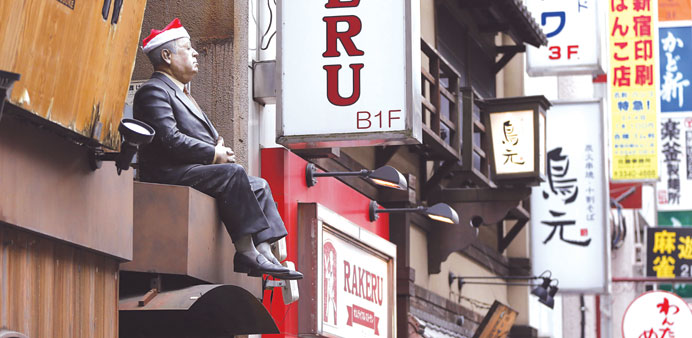A lifesized doll, adorned with a Santa hat, is seen above the doorway of a restaurant along a street at Tokyo’s Shinjuku shopping and business district yesterday. Japanese business confidence improved in the three months to December and is predicted to continue rising, a Reuters poll showed yesterday, adding to evidence of a steady recovery in the world’s third-largest economy.
Reuters
Japanese business confidence improved in the three months to December and is predicted to continue rising, a Reuters poll showed yesterday, adding to evidence of a steady recovery in the world’s third-largest economy.
The positive outcome suggests the central bank’s closely watched “tankan” quarterly survey, due out on December 16, will show a continued recovery in business sentiment as the benefits of premier Shinzo Abe’s stimulus policies broaden.
Data released yesterday showed Japan’s economy expanded less than expected in July-September, suggesting that the recovery remains fragile due to soft global demand.
Still, analysts were optimistic about the medium-term outlook. “There are already signs that exports and capital expenditure are recovering, so I am not pessimistic about the outlook,” said Yasuo Yamamoto, senior economist at Mizuho Research Institute in Tokyo.
“Economic growth should start accelerating again in the fourth-quarter as domestic demand strengthens before the sales tax increase.”
The Reuters Tankan, which has a close co-relation to the BoJ’s tankan survey, showed the indexes gauging sentiment for manufacturers and service-sector firms both improved five points from three months ago.
Manufacturers’ business confidence rose for a second straight month in December to hit a three-year high, as the weak yen helped boost exports of cars and electronics goods.
Service-sector mood also improved for to its best reading in more than 6-1/2 years, as consumers tried to beat a sales tax hike scheduled in April next year.
Both manufacturers and non-manufacturers expect business conditions to improve further in the next three months, suggesting that growth will pick up pace toward the current fiscal year-end in March.
While the government’s stimulus package will ease some of the pain from the sales tax hike expected next April, some policymakers fret about the slow recovery in exports and overseas growth.
If the economy faces a severe downturn as a result, it may increase pressure on the BoJ to expand its already massive monetary stimulus next year, some analysts say.
For now, the BoJ is likely to stand pat after having stunned markets in April by pledging to double base money via aggressive asset purchases to achieve 2% inflation in roughly two years.
The central bank is widely expected to keep monetary settings unchanged at its rate review next week.

